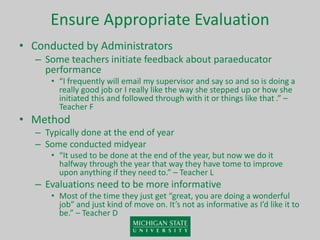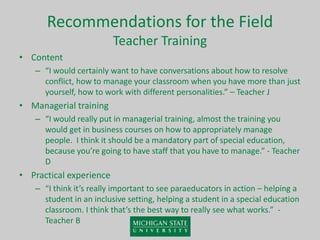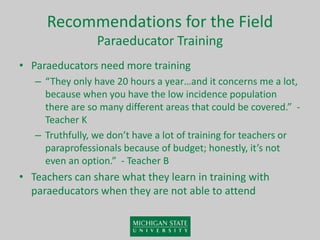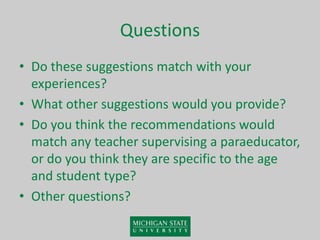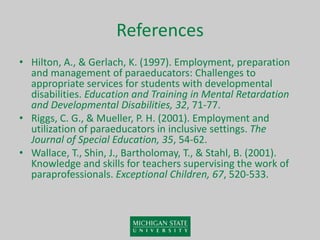1) Special education teachers feel paraeducator supports are essential but feel unprepared to supervise them. Both teachers and paraeducators report insufficient training.
2) The document outlines tips from 13 special education teachers on effectively supervising paraeducators. They stress creating effective teams by defining roles, emphasizing teamwork, respect, and communication.
3) Teachers provide training, feedback, and evaluation to paraeducators and recommend increased training for both teachers and paraeducators in supervisory responsibilities.
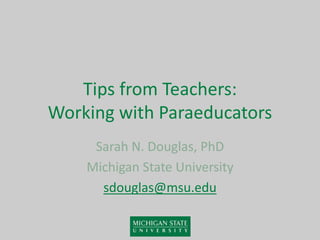
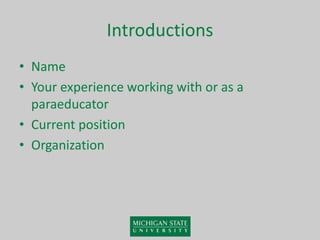
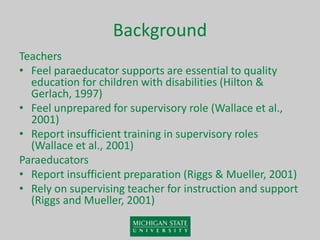
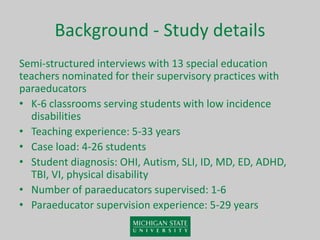
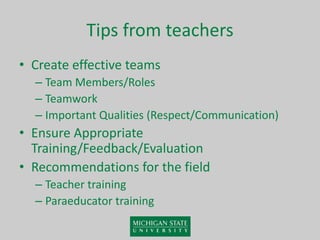
![Create Effective Teams
Team Members/Roles
• Special Education Teacher
– Accountability for what happens in the classroom
• “If [paraeducators] are not doing their job then my students are
not benefitting from what their academic day could look like.
Ultimately the ball is in my court and I need to make sure they are
making progress.” – Teacher J
-Documentation
• I “keep a log of any concerns of anything that I have because
documentation is very important especially in these days with
students, with adults, with anything like that.” – Teacher H
– Schedule/Plan
• “It’s really important [to share the schedule/plan] so that there is
no conflict between paraprofessionals or between teachers and
paraprofessionals.”- Teacher B](https://image.slidesharecdn.com/tipsfromteachers-150502205720-conversion-gate02/85/Tips-From-Teachers-Working-with-Paraeducators-6-320.jpg)
![Create Effective Teams
Team Members/Roles
• General education teacher
– Provide feedback to special education teacher
• “I get feedback from the general education teacher .” - Teacher A
• “I keep in close contact with the [general] education teachers.” –
Teacher E
• Administrator
– Responsible for evaluations
– Support special education teacher in supervision of
paraeducators
• “Every once and a while my supervisor will check in with me and say
‘how’s this change working’ or ‘how’s this person doing’.” - Teacher B
– Most teachers were well supported by administrators
• “All of the [administrators] I’ve worked with have always been very
supportive. I can call them…if there is a situation that would arise.” –
Teacher J](https://image.slidesharecdn.com/tipsfromteachers-150502205720-conversion-gate02/85/Tips-From-Teachers-Working-with-Paraeducators-7-320.jpg)
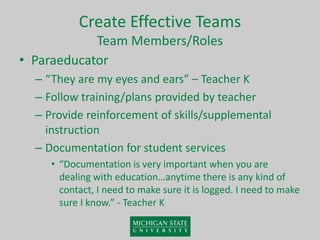
![Create Effective Teams
Teamwork
• Make paraeducators feel part of the team
– “Make [paraeducators] feel part of the team because I think
sometimes that they are forgotten and they get a little bit offended by
that.” – Teacher C
• Solve problems/make decisions as a team
– “[We} brainstorm our ideas as a team about what works and what
doesn’t work.” – Teacher G
– “Having team thinking is just key.” - Teacher M
• Work together closely
– “We work extremely closely together, physically, and academically.”-
Teacher A
• Teamwork easier with familiar team members
– “[We’ve} been together for about ten to fifteen years…she is as good
with my data collection as I am because we have worked together for
so long.” – Teacher J](https://image.slidesharecdn.com/tipsfromteachers-150502205720-conversion-gate02/85/Tips-From-Teachers-Working-with-Paraeducators-9-320.jpg)
![Create Effective Teams
Important Qualities - Respect
• Treat paraeducator as an equal
– “I would never ask them to do anything that I wouldn’t do myself” –
Teacher A
• Communicate respectfully
– “I look at it as how I wanted to be treated…I wanted to be a very
positive influence for the students as well as the people that come in
and out of the room.” – Teacher J
• Show appreciation for each other
– “I’ve tried to let [my paraeducators] know how much I appreciate
them…we all enjoy hearing when we are doing a good job.” – Teacher H
• Paraeducator who feel respected are more motivated
– “If you treat people with kindness, and show them that you respect
them…treat them the way you want to be treated, they will want to
know what they can do differently.” – Teacher K](https://image.slidesharecdn.com/tipsfromteachers-150502205720-conversion-gate02/85/Tips-From-Teachers-Working-with-Paraeducators-10-320.jpg)
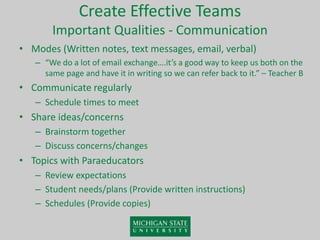
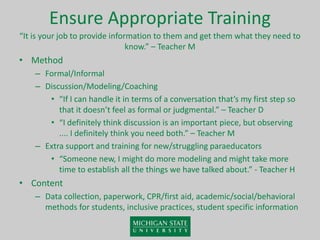
![Ensure Appropriate Feedback
• Observation
– In general and special education
– Observe frequently
• Especially for new or struggling paraeducators
– Measure progress
• “While I am taking data on the student’s progress I will
also…monitor how [the paraeducator] is doing.” – Teacher D
• Feedback
– Corrective/Supplemental/Reinforcement
• “Don’t just tell them what they do wrong…tell them what
they do right.” - Teacher K
– Immediate/Delayed
• “If I think it is something that can be easily corrected…I just
quickly step in and show them.” – Teacher L
– Feedback in private](https://image.slidesharecdn.com/tipsfromteachers-150502205720-conversion-gate02/85/Tips-From-Teachers-Working-with-Paraeducators-13-320.jpg)
